- Home
- Peter Orullian
The Hell of It Page 4
The Hell of It Read online
Page 4
Looking at the slip of paper and the pen in his hand, an idea flared. He shot the straw-boss a glance. Without asking, he reached and took Gynedo’s ink vial. He set aside the man’s pen, and gently reached into Marta’s writing set and retrieved the used stylus.
He rolled it in his fingers for a moment, then dipped the tip and set to the paper with the slow hand of one remembering something he’d heard long ago.
A girl will dream the day she takes a man
Of satin, beads, and clear skies filled with blue.
But I had no such dream or certain plan
The docks had long since taught me to make due.
But one thing I did hold as private wish
Against what I could see in poor Mum’s face
When bruises there from Father’s angry fist
Made her feel a woman’s poor disgrace—
That hands with which I shared my nightly bed
Were only rough when standing my defense
And gentler once to him I finally said
That rough men should possess the simple sense
To turn the fight against his actual fear
His worry that his child will grow up here.
When he’d finished, he let it sit for several moments, the ink drying naturally. The tension in the corner of the third deck of the riverboat grew thick, as onlookers waited with held breath. Finally, he turned the poem around and nudged it toward Gynedo, who read it with obvious interest. The man’s brows rose and fell comically, as his eagerness lapsed to confusion.
“And what is this?” he asked.
“It’s one of the poems my wife never had the chance to write down. One of my dearest memories of her.” He stopped, realizing something himself in that moment. “I’m a hard man to talk to. To tell things to. But she could make me listen, make me … understand when she told me her rhymes. Like that one.”
The straw-boss fingered the slip of paper, re-reading the newly-penned poem. “Are you putting this poem up as a bettor’s call? To the Carion Comfort?”
“No, sir.” Malen gave him a wicked grin. “A raise. I think it’s safe to say we’re in new waters here. You’ve already shown that you’re content to wager real collateral against items whose only value is what I place on them. So there you go.” He pointed to the poem.
The man made a long resonant sound that started in his nose and slid down his throat, the pitch dropping as it went. Clever, it seemed to say.
“And I suspect that if I were to continue raising the stakes, I’d get a slew of poems.” Gynedo was nodding, as one does when impressed.
“My memory’s water-tight where Marta’s poems are concerned,” Malen replied, holding the pen poised as though ready to write another one down.
The straw-boss barked a single loud blast of laughter. “Very well, my wharf friend. What say we call an end then? I’ve only so much paper, anyway.”
There was some laughter from the spontaneous gallery that had gathered.
Malen put the pen down and nodded. “Turn them up?”
“Turn them up.”
And together, they flipped over their down placks. Malen quickly calculated Gynedo’s cards, and felt a wave of relief when it came up well shy of his own feather count. He sat back, suddenly very tired. But the look on the other man’s face wasn’t the typical defeat or anger or appreciation for a worthy opponent. The man’s eyes and slim smile held the appearance of a winner. The casual good grace of one who doesn’t hoot over his victory, but takes it all in as though it was just as it should be.
Malen glanced down at his own plackards. His gut tightened painfully. Disbelief and dread filled his chest. His twelve-count magpie … was gone. In its place was an eleven-count quail. He rubbed at his eyes and picked up the plack, staring closely.
It’s changed. By every abandoning god, this was a magpie before!
As calmly as he could, he set it down, his mind racing to find words. To his right, as though through a haze, he heard a few gamblers clapping or laughing or remarking to friends. With the magpie, his was a winning hand. With a quail, it was far from it.
He finally looked dead into Gynedo’s eyes, trying to read the truth of what had happened. The straw-boss returned the stare, giving nothing away—a better gambler’s stare Malen had never seen. The fellow looked only amiable, maybe a tad sympathetic for Malen’s loss.
“You’re one hell of a chancer,” the man said, and offered his hand.
Malen shook his head, keeping his hands on the table, just as he’d done for most of the game. Finger down, they called it. Save those times when he was writing, he’d left his hand laid casually over his down cards—an old bettor’s habit to avoid the simple cardsharp tricks of placks being replaced when distractions pulled his eyes away from the table. He didn’t see any way the man could have replaced the magpie plack.
What, then? He puzzled it over quickly. A glamour? Did the straw-boss have that simple rendering skill? Or did he have an accomplice nearby who did? One of these onlookers?
“… don’t be sour,” Gynedo was saying. “Take my hand in good faith. It was a square game. A good one.”
Malen gave him a dead glare. “The plack changed. I don’t know how. But this quail was a magpie. The pot is mine.”
The straw-boss’s smile faltered, his hand dipped. Then he sat back, his expression becoming serious. “You’re calling me a cheat.”
“That’s not what I said. But I’m no plunger. Not wet like half the bettors who sit here. I know my count.”
“Yes, I’m sure you do,” the man said. “But a quail looks an awful lot like a magpie in this set of placks. And there’s a desperation in your play.” He sat forward, folding his hands together on the table and leaning toward Malen. “You tried to keep it to yourself, but I saw it clearly enough. No doubt it clouded your vision.”
Malen shook his head. “No. The plack was a twelve-feather magpie. It has changed.”
Gynedo’s expression darkened, became threatening. “Then you are calling me a cheat. And I won’t have it.”
Leaning in himself, Malen let all the dread of what losing would mean sharpen into a counterthreat. He spoke softly. “Here’s what. We either play again—this time, all-up Double Draw—or you will simply give me my things, and I will leave your boat. Anything else, and I will bring the city guard to investigate all your games. Which would you prefer?”
The man’s face slowly lit with a new kind of smile. There was a hint of pity in it. Maybe a dusting of appreciation for Malen’s audacity. What could not be found in this new smile was concern. He gave a very deliberate look to two men standing in the makeshift gallery of onlookers.
Then, he spoke with utter casualness. “Unless I’ve missed something, you’ve nothing left to wager. And others are waiting to play. Please do me the courtesy of getting off my boat without a fuss.”
Malen glared back at the man. Then his eyes slipped down to Marta’s nice things. He couldn’t let them be taken this way. Not by a cheat. So he simply started to gather them.
Before he knew what was happening, three very large men had seized his arms, ripped Marta’s things from his hands, and were roughly escorting him out a rear door at the back of the third deck. He struggled, but the hands gripping his wrists and shoulders were like iron. A few moments later, his arms were free, pinwheeling as he fell from the third deck, tossed overboard into the dark harbor waters.
Thrown overboard like a damn plunger.
The cold bit his skin as he sank deep into the bay. He flailed wildly, trying to reach the surface. Every direction looked the same. He swallowed several mouthfuls of briny water before calming himself long enough to note the glimmer of light behind him. He got himself oriented and kicked hard. A long, desperate moment later he broke the surface and gasped for air.
The three men hadn’t waited for him to emerge. And in the night, the sounds of laughter and shouts of loss and elation rolled out over the harbor like the calls of loons. Malen got his
breath back and swam to the pier ladder, where he climbed up and sat, exhausted.
His wet clothes clung to his skin. And he shivered in the cold night air, too weary just now to stand. Several moments later, the sound of boots on wharf planks came in muted rhythms, until two men stood on either side of him. They hunkered down, staring out at the harbor with Malen.
“Damn cheat, Gynedo is,” the man on his right said in a confidential tone.
“Saw the whole thing,” the other said. “Been there myself. Lost my own catch to the bastard.”
Malen wiped his eyes and turned to look at each man. “What’s any of that to me?”
“Only this,” the first man replied, still looking off into the harbor. “We know where Gynedo lives. His dockside rooms, you understand. We have a mind to take back what we’ve been cheated out of. Or as much in coin, if that’s what we find.”
“You’re going to rob him?” Malen found the idea distasteful, but not unthinkable.
“That’s the wrong way of looking at it,” the second man answered. “He’s got things that don’t belong to him. Things he took unfairly. The strong law won’t see it that way. So we’ll go quiet-like to get them back. We’re putting balances right, is all. You in?”
Malen imagined returning home, facing Roth empty-handed. Marta’s things gone, nothing to show for it. But if he went with these men, and they succeeded, how would he explain it to his boy? He could maybe rationalize it for himself, but even that felt wrong. That wasn’t the way ahead for him and Roth. He’d very nearly turned the men down, when something occurred to him: A man saved from robbery might show a generous hand to the one who saves him. He would be playing a dangerous game. But the night had been filled with such.
He stood, slicking back his hair. “Let’s go.”
The first man clapped him on the back. “Damn straight,” he said, and led them from the dock.
They walked back alleys all through town, weaving in and out of various wharf districts, always careful to keep distance between themselves and other folk strolling the night. After the better part of an hour, they’d wound back to within five hundred paces of where they’d begun. There was some logic in the approach, Malen realized, coming at a dockside inn from the rear, down a narrow, untraveled footpath.
A set of wooden stairs rose to the second level, where a row of dark windows indicated vacancies or sleeping guests. The two men started up, Malen following.
The first man stopped. “No,” he whispered. “All we need is a lookout. Just stand here.” He pointed to one side of the staircase. “If anyone comes, stop them. Make like you’re drunk if you have to. And if someone gets by, go around to the inn tavern. Make a fuss. Get them all going loud and angry. Understand?”
Malen nodded.
The two men gave him serious looks, then ascended the stairs and disappeared inside. He stood alone, still damp and cold, in the moonlight. His breath steamed the air, and he wondered if Roth had gotten himself to bed. He hated that the boy was having to look after himself while his da was out gambling to try and get them a stash of their own. This wasn’t at all what Marta wanted. The docks be damned!
But then, maybe, just maybe, this one indiscretion would put them ahead. And that plack had been a magpie. He knew it. His eyes could be fuzzy at times, he’d grant that. But he’d seen that bird clear—twelve feathers, black and white with hints of blue.
The night filled with the sound of boots scurrying across wood steps. He turned fast and saw his accomplices rushing down the staircase, wild looks in their eyes. One took the time to nod to him. Together they lit out from the rear of the inn, relaxing into a casual gait once they got to open roads. The first man led them on another circuitous walk through wharfside districts. They even began to share idle banter.
They passed a uniformed city-man slowly walking the street, and ducked into a narrow byway. The alley jutted left then right, then left again, leaving them utterly alone. The sounds of the city faded to practically nothing here. In the shadows, the first man stepped up to a door and quietly depressed the latch. He slipped inside, the second man following close behind. Malen hesitated only briefly, caution beating hard in his chest. The door closed quickly and softly behind him, a cross brace swung down with a bare tep sound as it locked in place.
A small candle was lit, and the two men positioned themselves between it and the shuttered windows. Then onto the table they emptied their pockets and several small sacks hidden beneath their coats. Malen’s eyes widened at the stolen bounty: gold handcoins, silver half-bars, a good handful of gems (every color you could imagine), maybe fifty promissory notes, and three sacks full of steel plugs (realm-embossed). On a bad day, the realmcoin would trade for eighty thin plugs.
He spent a moment memorizing their faces. Malen figured that sharing a description of the thieves and handing over some of the loot besides, he’d come off a hero. And stand a very good chance of being on the right end of Gynedo’s gratitude.
“I’ll take my third now,” Malen said. “I need to get home.”
Almost as if rehearsed, the two men drew knives and pointed them at him. “Appreciate your help. You can go.”
I’m a fool.
“The hell I will. You can draw all the knives you own. I’m not leaving without my share.”
The second man picked up a steel realmcoin and tossed it to him. “There. Paid.”
The men sniggered, and one began separating the loot by coin type.
“And if you get brave, remember that son of yours,” the first man said, his fingers gingerly building piles of coin.
“Exactly right,” Malen muttered.
These thieves had no idea who they were speaking to: A father who’d run out of options for how to put meat on his family’s table; a widower who’d gambled away the last tangible pieces of his lost love; a man whose only thing of value left was a promise he’d made. One he’d keep, by damn.
None of which meant he wasn’t scared at the prospect of fighting men with knives. Foolish thing to do. He’d avoid it if he could. But it might wind up being the only way to make good on that promise—to take care of Roth, see that the boy grew up proper, even if it had to be on the wharf.
The men had begun putting the loot back into bags, this time organized and divided for each to carry. Roth thought about the city-man not too far off, and backed slowly toward the door.
What came next passed in a blur.
The men turned just as Malen threw back the cross brace, flung open the door, and cried out into the alley, “Here! The thieves are here!”
The two men dashed toward him. Malen ducked into the alley, raising the alarm again. “The thieves are here!”
Just keep them in the alley until the city-man arrives.
He’d gotten five paces from the door, and was just turning to meet his pursuers, when hands yanked him back. He swung around and struck blindly, hitting nothing. A barrage of heavy fists beat his face and neck and chest. He fell. Boots laid into his gut, stealing his air, and kept pounding at his face and groin. He took a severe beating, tasting blood in his throat and feeling bones snap as he tried to curl into a defensive ball.
He drew ragged breaths down his throat trying to withstand the assault. And mercifully, one hard strike on the head sent him into blackness.
* * *
He awoke to the cries of harbor gulls. Muted grey light filled the sky high above the alley where he lay stiff and cold. He knew this time of morning, when men would soon be trudging toward the docks for another day with their nets. It held a strange quality, both hopeful and sad. Make a good poem for Marta, he thought randomly. Morning seemed to bring with it the promise of some new thing, and yet, walking through the grey dawn toward another day aboard a trawler, eking out a thin plug … it was a dreary, monotonous life.
Malen rolled onto his stomach, grunting with the sharp pain of ribs he knew were broken. But it was the only way to push himself up to his knees. After struggling to his feet, he began his
slow, painful walk home. He hoped his boy was safe. Hoped that he’d slept well, not knowing Malen hadn’t come home. And hoped he would forgive Malen. For everything.
His body had loosened up somewhat by the time he came to his stoop. He brushed back his hair with his fingers, scrubbed his face briskly with his rough hands, and began to key the lock … but it was already open.
With his heart beginning to race, he hurried through the door. One step inside, he stopped abruptly. Four men sat in his home, two city guards and two Leaguemen. And between the latter stood Roth, looking terrified.
He knelt as his boy raced into his arms. The force of it against his beaten body, not to mention the lad’s tight embrace, hurt quite a lot. But he didn’t let it stop him from hugging his son in return.
“It’ll be all right,” he whispered into Roth’s ear. He felt a stuttering breath against his neck, a shuddering sob.
He looked over the child’s shoulder. “What’s this about?” he asked.
“Are we going to begin with deception?” one Leageuman said. “Or should we start simply with the fact of a father leaving his son alone all night in a wharf tenement?”
“You can see I was beaten,” Malen explained.
“About that,” one of the city guards said, stroking his bearded chin the way a man does when he wishes to appear thoughtful. Or smug. “Can you tell us who would have beaten you … and why?”
Malen glanced at the other city guard. He could read the bluff there better than on the first city-man. They already knew the answers to their questions. But how? Regardless, he’d have to answer carefully.
“I was beaten trying to alert men like yourselves about a pair of thieves.” He felt Roth tighten his grip around his neck. “No one came, though. I suppose no one heard me, since I was left to lie in an alley all night.” He gave his questioner a knowing look. “City guards wouldn’t leave me out at the seams if they knew I was there, right?”
“What strikes us,” the second guard said, irony dripping from his words, “is how you knew they were thieves. Lying in an alley, beaten, sounds like the tale of a wharf-game fellow betrayed by his flimflam mates.”

 At the Manger
At the Manger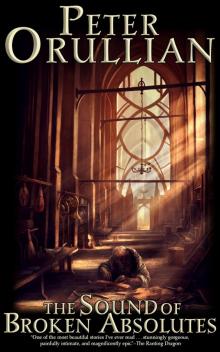 The Sound of Broken Absolutes
The Sound of Broken Absolutes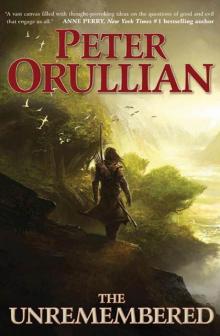 The Unremembered: Book One of The Vault of Heaven
The Unremembered: Book One of The Vault of Heaven The Hell of It
The Hell of It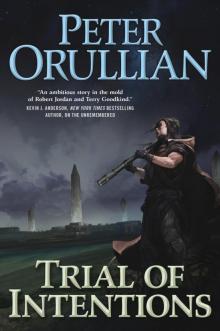 Trial of Intentions
Trial of Intentions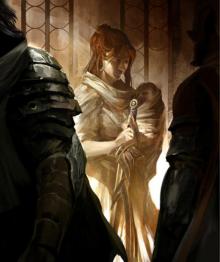 The Great Defense of Layosah
The Great Defense of Layosah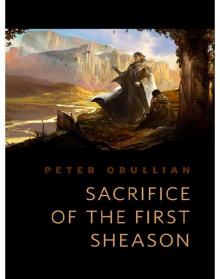 Sacrifice of the First Sheason
Sacrifice of the First Sheason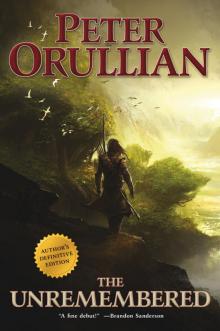 The Unremembered
The Unremembered